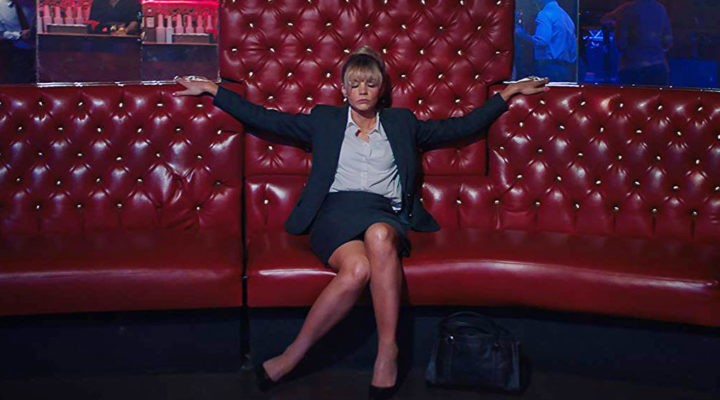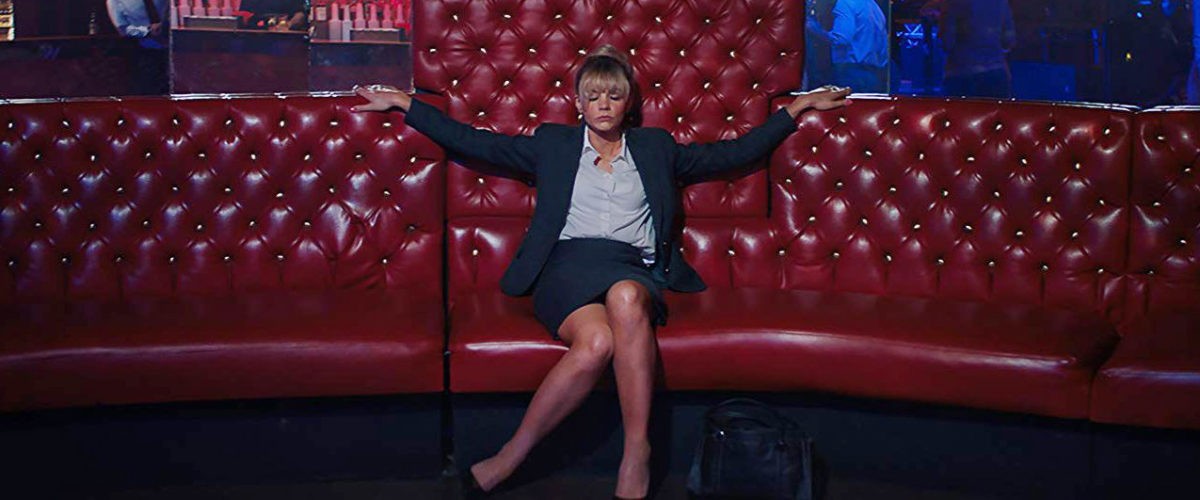When Judge Aaron Persky reduced Stanford rapist Brock Turner’s sentence from six years in state prison to six months in county jail, he did so on the basis that Turner was “a promising young man.” Writer/director Emerald Fennell’s stark thriller/fairytale Promising Young Woman (nominated for five Academy Awards including Best Picture and Best Director), is not only an artfully constructed parable on misogyny and the staggering costs of sexual assault, it is a come-to-Jesus moment for all men, including those who think of themselves as essentially decent.
In a time when Matt Gaetz, Andrew Cuomo and virtue culture killings have dominated the headlines, Promising Young Woman is an essential film about misogyny, sexuality and male privilege.
WARNING: SPOILER ALERT. If you prefer to be surprised by this film, please don’t read further until after you have watched it.

Greg Garrett
Promising Young Woman opens with a woman in trouble: On a red banquette in a nameless bar, Cassandra (Carey Mulligan), an attractive blond woman, struggles to hold herself upright. Three middle-management types in suits have been talking about how unfair it is that they have to change their work practices to accommodate female co-workers. Then they spy Cassandra, and their conversation shifts. Which of them will try to pack her up and take her home?
Jerry (Adam Brody), wins the lottery. He comes over, expresses his faux concern for her safety, and bundles her into an Uber. He takes her back to his place, where she is unresponsive to his come-ons and says she needs to lie down. Jerry begins to kiss and disrobe her. Cassandra mutters, “What are you doing?” but Jerry continues.
Shrieking strings worthy of Hitchcock begin to swell as we see what is about to happen. Cassandra opens her eyes — wide and sober — and in a hard-edged voice, repeats her question: “What are you doing?”
Jerry is, rightly, terrified. His drunken and easy mark has vanished, and in her place is the real Cassandra, eyes blazing, a force of righteous anger.
And we roll credits.
It turns out that every weekend for a long, long time, Cassandra has been going to bars and pretending to be falling-down drunk. There’s always a guy who identifies himself as — and may genuinely believe himself to be — a nice guy. He tells her he’ll make sure she gets home OK.
Then that nice guy takes her to his house, tries to have sex with her even though she does not give consent, and at last, she rises up and challenges these men with the reality of their actions.
These clearly are not the deeds of a settled mind. We gradually learn that some years ago, when they were both in medical school, Cassandra’s friend Nina was raped at a party while she was intoxicated. Nina brought a complaint against the rapist, Al Monroe (Christopher Lowell), which wasn’t taken seriously. Shattered by the experience, Nina dropped out of med school (Cassandra followed suit), spiraled downward and ultimately died by suicide. All these weekend vigilante raids are Cassandra’s way of pushing back against what New York Times critic Wesley Morris calls “a culture of misogyny that both facilitates these assaults, then buries them when they come to light.”
“Promising Young Woman asks hard questions about our society.”
Promising Young Woman asks hard questions about our society, and, sadly, it asks them both about the secular rape culture represented by sexual predators and also about the religious virtue culture promoted by Christian evangelicals.
What both of them have in common is shame and blame: Women are ultimately responsible for male lust and for sexual evil.
“She should have known better,” is a response lofted about Nina’s drinking the night of her assault, and about Cassandra’s character in the scenes of her infiltrating bars and seemingly drinking herself into insensibility.
It’s a trope that Cassandra actually plays on the med school dean (Connie Britton) who didn’t take Nina’s complaint seriously (in one of the most chilling scenes in the film, Cassandra tells her that her teenage daughter is alone in a room with some men and they are all drinking; is she more concerned now?).
It’s a trope that Cassandra turns back onto Madison (Allison Brie), the former classmate who likewise blames Nina for her own assault, getting the insufferable woman staggering drunk and then paying a man to lug Madison into a hotel and put her into bed, not knowing what may have happened to her in the process.
“In a world where Rep. Matt Gaetz and accused Atlanta murderer Robert Aaron Long have a surprising amount in common, Promising Young Woman forces audiences to grapple with the question of whether any men are truly good.”
In a world where Rep. Matt Gaetz and accused Atlanta murderer Robert Aaron Long have a surprising amount in common, Promising Young Woman forces audiences to grapple with the question of whether any men are truly good. It introduces a potential love interest, Ryan (Bo Burnham), who remembers Cassandra from med school, and presents the developing relationship like a romantic comedy, including a family dinner with Cassandra’s parents and a sort of music video where Mulligan and Burnham dance and sing to a Paris Hilton song during a late-night drugstore run for snacks. But ultimately, Ryan too will reveal himself to be imperfect, a figure attached to the larger story of Nina’s rape and disgrace.
These tonal tensions between horror and romantic comedy, this larger exploration of the gray space in the fairy tale into which most men, unfortunately, seem to fall, is heightened by Fennell’s brilliant casting. Almost every figure in the film is familiar from previous sitcoms, TV dramas or films, which could lead us to give those characters (like Jerry, played by Adam Brody from The O.C., Madison, played by Alison Brie from Community, or Dean Walker, played by America’s sweetheart Connie Britton, formerly Tami Taylor on Friday Night Lights) the benefit of the doubt. If even these genial people — the “good people” they all insist themselves to be — are capable of assault or neglect, then what hope is there?
The movie ends happily in a sense — it is a fairy tale, after all — even though it’s absolutely not the ending we hoped for. By placing its hope in the criminal justice system, Promising Young Woman is a white wish-fulfilment fantasy — clearly the sound of police sirens is not a hopeful thing for many of my fellow Americans — and the involvement of the police does wrap this beautifully written film up air-tightly.
But as Times critic Wesley Morris laments: If only the pain and suffering of sexual assault victims and those who love them could have this sort of closure.
I will be haunted by this movie for a long time.
I hope many of us will.
Greg Garrett teaches creative writing, film, literature and theology classes at Baylor University. He is the author of two dozen books of fiction, nonfiction, memoir and translation, including the critically acclaimed novels Free Bird, Cycling, Shame and The Prodigal. He is one of America’s leading voices on religion and culture. One of his most recent nonfiction books is In Conversation: Rowan Williams and Greg Garrett. His latest book, A Long, Long Way: Hollywood’s Unfinished Journey from Racism to Reconciliation, is hot off the presses. He is a seminary-trained lay preacher in the Episcopal Church. He lives in Austin with his wife, Jeanie, and their two daughters.


